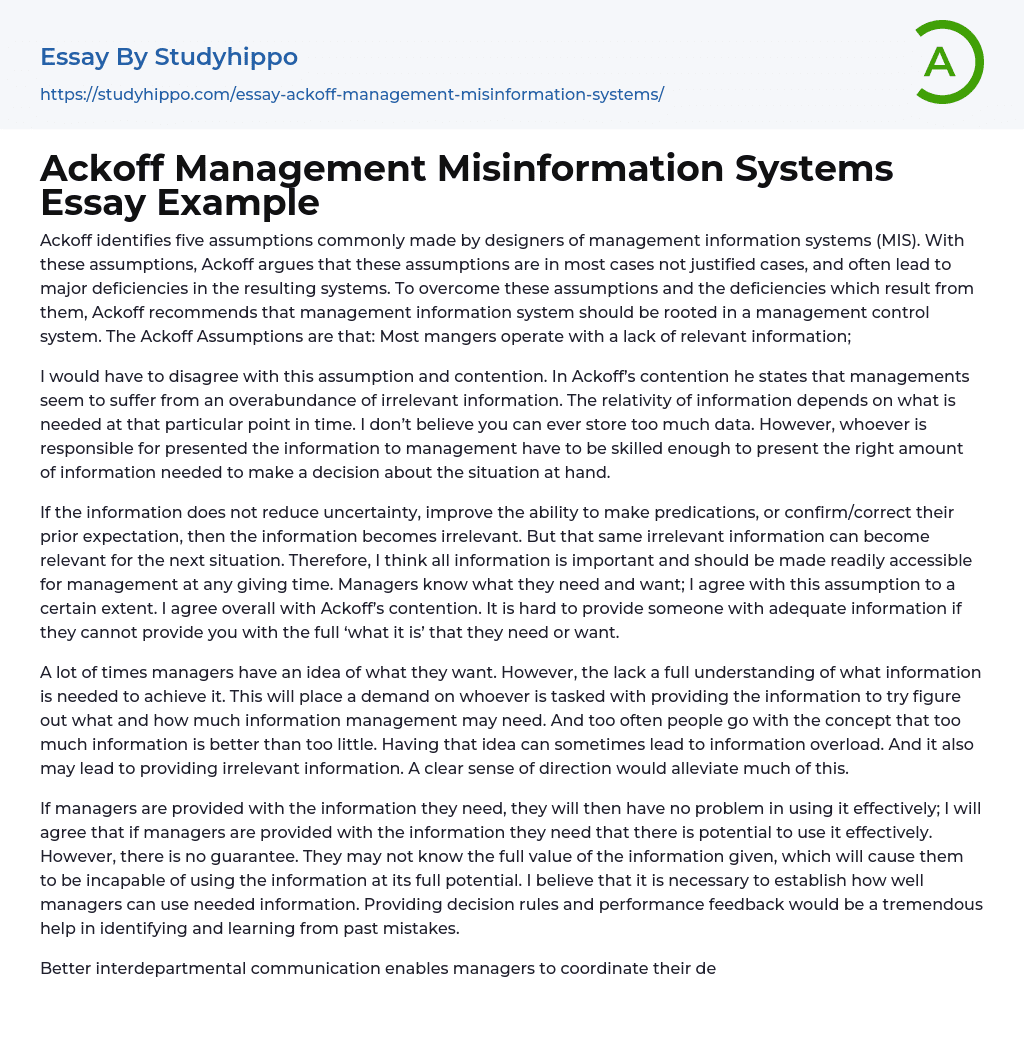Ackoff identifies five assumptions commonly made by designers of management information systems (MIS). With these assumptions, Ackoff argues that these assumptions are in most cases not justified cases, and often lead to major deficiencies in the resulting systems. To overcome these assumptions and the deficiencies which result from them, Ackoff recommends that management information system should be rooted in a management control system. The Ackoff Assumptions are that: Most mangers operate with a lack of relevant information;
I would have to disagree with this assumption and contention. In Ackoff’s contention he states that managements seem to suffer from an overabundance of irrelevant information. The relativity of information depends on what is needed at that particular point in time. I don’t believe you can ever store too much data. However, whoever is responsible for presen
...ted the information to management have to be skilled enough to present the right amount of information needed to make a decision about the situation at hand.
If the information does not reduce uncertainty, improve the ability to make predications, or confirm/correct their prior expectation, then the information becomes irrelevant. But that same irrelevant information can become relevant for the next situation. Therefore, I think all information is important and should be made readily accessible for management at any giving time. Managers know what they need and want; I agree with this assumption to a certain extent. I agree overall with Ackoff’s contention. It is hard to provide someone with adequate information if they cannot provide you with the full ‘what it is’ that they need or want.
A lot of times managers have an idea of what they want. However, the lack a full
understanding of what information is needed to achieve it. This will place a demand on whoever is tasked with providing the information to try figure out what and how much information management may need. And too often people go with the concept that too much information is better than too little. Having that idea can sometimes lead to information overload. And it also may lead to providing irrelevant information. A clear sense of direction would alleviate much of this.
If managers are provided with the information they need, they will then have no problem in using it effectively; I will agree that if managers are provided with the information they need that there is potential to use it effectively. However, there is no guarantee. They may not know the full value of the information given, which will cause them to be incapable of using the information at its full potential. I believe that it is necessary to establish how well managers can use needed information. Providing decision rules and performance feedback would be a tremendous help in identifying and learning from past mistakes.
Better interdepartmental communication enables managers to coordinate their decisions more effectively; I do agree that communication is needed and very important when it comes to effectively working together. An organization cannot function properly in the absence of communication. However, I agree with Ackoff’s contention that there needs to be a limit on the communication between each department. The example given is a perfect illustration of how having access to too much information can become detrimental to success of a company. Everyone wants achieve an excellent performance rating.
To give each department with conflicting performance ratings
access to each other’s information will have the potential to cause conflict within the organization. Therefore is important to assess the organizational structure and the performance measure before determining what information can be shared. A manager doesn’t have to understand how his information system works, only needs to know how to use it. I most definitely disagree with this assumption. To install the best possible systems management infrastructure, you must first thoroughly understand the system you intend to manage.
If the manager only knows how to use the system, it means that the manager is limited to that specific task. At any given time, any sort of problem can arise and cause a problem and without any understanding, the manager will remain clueless as to what to do. The manager will then have to depend on someone else to troubleshoot the problem. That is if the problem has been identified. According to the case cited, it took a year to uncover a major malfunction of the newly implemented system. $150,000 a month is a lot to pay for not having a full understanding of the system.
References
http://www.acasa.upenn.edu/ackoff67.pdf
- Leadership and Management essays
- Change Management essays
- Project Management essays
- Knowledge Management essays
- Operations Management essays
- Quality Management essays
- Risk Management essays
- Scientific Management essays
- supply chain management essays
- Performance Management essays
- Time Management essays
- Brand Management essays
- Total Quality Management essays
- Risk essays
- Manager essays
- Leadership essays
- Business Ethics essays
- Board Of Directors essays
- Product Management essays
- Comparative Analysis essays
- Decision Making essays
- Dispute Resolution essays
- Stress Management essays
- Business Management essays
- Brand Equity essays
- Branding essays
- Nike, Inc. essays
- Market share essays
- Razor essays
- Being A Leader essays
- Servant Leadership essays
- Leadership Experience essays
- Leadership Qualities essays
- Incentive essays
- John Locke essays
- 9/11 essays
- A Good Teacher essays
- A Healthy Diet essays
- A Modest Proposal essays
- A&P essays
- Academic Achievement essays
- Achievement essays
- Achieving goals essays
- Admission essays
- Advantages And Disadvantages Of Internet essays
- Alcoholic drinks essays
- Ammonia essays
- Analytical essays
- Ancient Olympic Games essays
- APA essays




